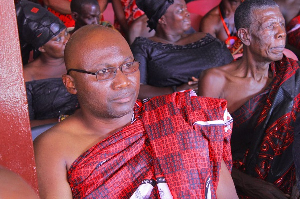Business News of Monday, 29 September 2014
Source: B&FT
We are being taxed to death – Local airlines
Local airlines have called for a review of the regulatory regime governing domestic air travel if the full potential of the industry is to be realised.
Government’s imposition of tax on the importation of aircraft spare-parts by domestic operators and the recent extension of the 17.5 percent Value Added Tax (VAT) to cover domestic air travel threatens to derail gains made in domestic air travel over the past decade, industry players say.
“The airline business is a labour intensive industry, so you would have thought that government policies would champion the industry. We haven’t seen it yet, but we hope that sooner or later there will be a change of government policy that favours the airlines,” said Apiigy Afenu, Chief Operating Officer of Africa World Airlines (AWA).
“We are not asking for subsidy, no! But look at this sort of discriminatory policy where international carriers don’t pay taxes on their imported spare-parts but domestic carriers are made to pay. We cannot be talking about making this place an aviation hub and then enact legislation that taxes us to death. Dead men don’t talk, and they don’t create jobs,” Mr. Afenu said.
James Eric Antwi, Chief Executive Officer of Starbow, agrees that the taxes need to be looked at again since they are negatively impacting the local airline business.
“When we import spare-parts for our aircraft we pay taxes on them. International carriers do not pay taxes on their spare-parts, simply because the authorities say the service is not consumed here in Ghana,” he told the B&FT.
Another issue the local airlines are not happy about is the recommendation by a government consultant that suggests blanket compensation packages to passengers of both international and domestic airlines.
The recommendation is captured in a final report titled “Consultancy Services for the Review, Drafting and Development of Regulations for the GCAA”, submitted by Nathan Associates International to the Chief Director of the Ministry of Transport.
Since local travel costs much less, the domestic operators feel it would be unjustifiable for them to be required to, for example, accommodate passengers caught up in flight delays just as is required of international airlines.
Mr. Apiigy said: “I am not happy with the level of compensation being proposed. How can you recommend compensation packages higher than the airfare? I think that some of these things are not well-informed”.
Significant gains have been made in the country’s aviation sector. With just one main domestic operator and a dozen international carriers flying to Ghana in 2009, the GCAA management over the last decade has successively encouraged the growth of indigenous carriers and attracted strategic international airlines into the country.
There are now about 42 scheduled flights servicing the Kotoka International Airport, including three major domestic airlines -- Antrak, Starbow and Africa World Airlines.
The growth in passenger throughput over the past decade as a result of competition has required the improvement in on-ground infrastructure.
The Ghana Airports Company Limited (GACL) is undertaking rehabilitation and expansion work on the Kotoka International Airport. Expansion works on the Terminal 2 arrival hall is underway. The project began in June 2014 and is expected to be completed by the end of the year.
The first phase involves expansion of the existing arrival hall by 5,148m2, provision and installation of two new baggage handling units to bring the number of carousels in the arrivals hall to four.
Upgrading work on the Tamale domestic airport to bring it to international standard is on-going following the official sod-cutting a few weeks ago.
The first phase of the project consists of extending the runway from the current 2,480 metres to about 3,940 metres, and the installation of a complete lighting system to accommodate bigger aircraft so as to serve as the second international airport in the country. It is supposed to serve as an alternative to the Kotoka International Airport (KIA).
Rehabilitation work on the Kumasi Airport runway is also progressing steadily. Phase-one of the project involves the construction of a regulating course. The second phase involves an additional layer on the runway (binding and wearing course), and installation of runway lights to allow night operations. Work is expected to be completed in December 2014.
The runway’s current length is 1,981 metres and there are plans to expand it in the future. The future expansion will also involve construction of a parallel runway and apron to accommodate more flights to the region.











